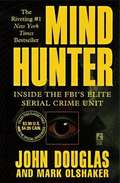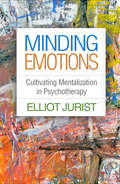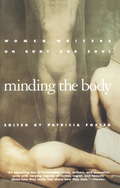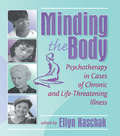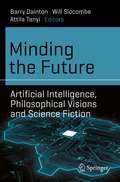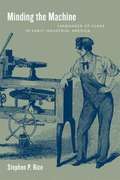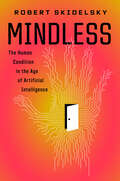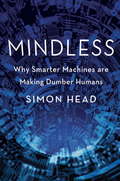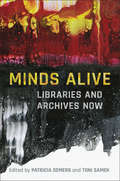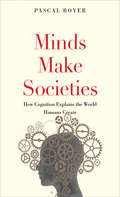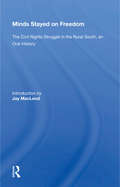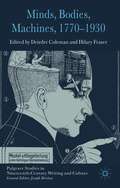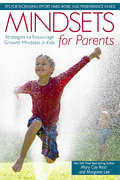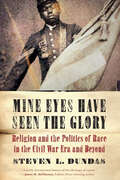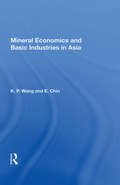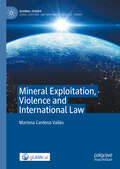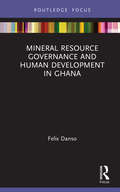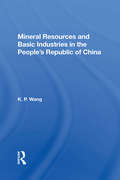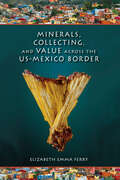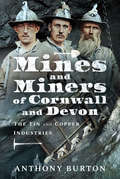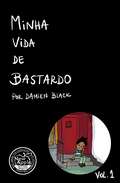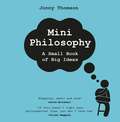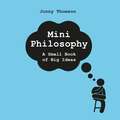- Table View
- List View
Mindhunter: Inside the FBI's Elite Serial Crime Unit
by John E. DouglasDuring his twenty-five year career with the Investigative Support Unit, Special Agent John Douglas became a legendary figure in law enforcement, pursuing some of the most notorious and sadistic serial killers of our time: the man who hunted prostitutes for sport in the woods of Alaska, the Atlanta child murderer, and Seattle's Green River killer, the case that nearly cost Douglas his life. As the model for Jack Crawford in The Silence of the Lambs, Douglas has confronted, interviewed, and studied scores of serial killers and assassins, including Charles Manson, Ted Bundy, and Ed Gein, who dressed himself in his victims' peeled skin. Using his uncanny ability to become both predator and prey, Douglas examines each crime scene, reliving both the killer's and the victim's actions in his mind, creating their profiles, describing their habits, and predicting their next moves. Now, in chilling detail, the legendary Mindhunter takes us behind the scenes of some of his most gruesome, fascinating, and challenging cases -- and into the darkest recesses of our worst nightmares.
Minding Emotions: Cultivating Mentalization in Psychotherapy (Psychoanalysis and Psychological Science)
by Elliot JuristMentalization--the effort to make sense of our own and others' actions, behavior, and internal states--is something we all do. And it is a capacity that all psychotherapies aim to improve: the better we are at mentalizing, the more resilient and flexible we tend to be. This concise, engaging book offers a brief overview of mentalization in psychotherapy, focusing on how to help patients understand and reflect on their emotional experiences. Elliot Jurist integrates cognitive science research and psychoanalytic theory to break down "mentalized affectivity" into discrete processes that therapists can cultivate in session. Clinical vignettes are interspersed with discussions of published memoirs that examine emotions in the context of autobiographical memory. A reproducible assessment instrument (the Mentalized Affectivity Scale) can be downloaded and printed in a convenient 8 1/2" x 11" size.
Minding the Body
by Patricia FosterA mulitcultural anthology of fiction and non-fiction literary narratives which addresses the psychological and political aspects of a woman's body in today's culture. An important and much-needed book for women who seek to understand their bodies and find independent, imaginative ways to cope with aging, beauty expectations beauty expectations, and ethnic comparisons.From the Trade Paperback edition.
Minding the Body: Psychotherapy in Cases of Chronic and Life-Threatening Illness
by Ellyn KaschakSupport and empower women who are coping with the pain, fear, and stigma of serious diseaseBeing diagnosed with cancer, chronic fatigue syndrome, or fibromyalgia is a traumatic event that takes place at a time when the patient is already feeling physically (and often emotionally) drained. Minding the Body combines feminist and social constructionist approaches to offer an intimate look into the ways a therapist can help clients cope with the pain, fear, and stigma of serious disease.Minding the Body offers an alternative to the reductive view of the mind-body connection and also examines the potential for growth that such experiences often allow. The essays gathered here show how an effective therapist can help the client deal with the painful and difficult emotions that exacerbate illness, while learning the emotional and spiritual lessons illness can teach. Minding the Body presents both theoretical views and personal accounts of illness, including: scholarly discussions of the issues involved in autoimmune disorders a therapist's personal experience of chronic fatigue syndrome a personal and professional exposition of a woman's struggles with injury, illness, and managed care, co-written by client and therapist suggestions for understanding the social construction of illness and treating disease from a social-constructivist point of view narratives reflecting on the change and growth of therapists diagnosed with cancer and other serious illnessesBy looking at illness in the context of mind, body, society, and medical establishment, Minding the Body will help therapists, doctors, nurses, counselors, and clients deal with the grief, disappointment, and frustration of chronic and life-threatening illness.
Minding the Future: Artificial Intelligence, Philosophical Visions and Science Fiction (Science and Fiction)
by Barry Dainton Will Slocombe Attila TanyiBringing together literary scholars, computer scientists, ethicists, philosophers of mind, and scholars from affiliated disciplines, this collection of essays offers important and timely insights into the pasts, presents, and, above all, possible futures of Artificial Intelligence. This book covers topics such as ethics and morality, identity and selfhood, and broader issues about AI, addressing questions about the individual, social, and existential impacts of such technologies. Through the works of science fiction authors such as Isaac Asimov, Stanislaw Lem, Ann Leckie, Iain M. Banks, and Martha Wells, alongside key visual productions such as Ex Machina, Westworld, and Her, contributions illustrate how science fiction might inform potential futures as well as acting as a springboard to bring disciplinary knowledge to bear on significant developments of Artificial Intelligence. Addressing a broad, interdisciplinary audience, both expert and non-expert readers gain an in-depth understanding of the wide range of pressing issues to which Artificial Intelligence gives rise, and the ways in which science fiction narratives have been used to represent them. Using science fiction in this manner enables readers to see how even fictional worlds and imagined futures have very real impacts on how we understand these technologies. As such, readers are introduced to theoretical positions on Artificial Intelligence through fictional works as well as encouraged to reflect on the diverse aspects of Artificial Intelligence through its many philosophical, social, legal, scientific, and cultural ramifications.
Minding the Machine: Languages of Class in Early Industrial America
by Stephen Patrick RiceIn this innovative book, Stephen P. Rice offers a new understanding of class formation in America during the several decades before the Civil War. This was the period in the nation's early industrial development when travel by steamboat became commonplace, when the railroad altered concepts of space and time, and when Americans experienced the beginnings of factory production. These disorienting changes raised a host of questions about what machinery would accomplish. Would it promote equality or widen the distance between rich and poor? Among the most contentious questions were those focusing on the social consequences of mechanization: while machine enthusiasts touted the extent to which machines would free workers from toil, others pointed out that people needed to tend machines, and that that work was fundamentally degrading and exploitative. Minding the Machine shows how members of a new middle class laid claim to their social authority and minimized the potential for class conflict by playing out class relations on less contested social and technical terrains. As they did so, they defined relations between shopowners--and the overseers, foremen, or managers they employed--and wage workers as analogous to relations between head and hand, between mind and body, and between human and machine. Rice presents fascinating discussions of the mechanics' institute movement, the manual labor school movement, popular physiology reformers, and efforts to solve the seemingly intractable problem of steam boiler explosions. His eloquent narrative demonstrates that class is as much about the comprehension of social relations as it is about the making of social relations, and that class formation needs to be understood not only as a social struggle but as a conceptual struggle.
Mindless: The Human Condition in the Age of Artificial Intelligence
by Robert SkidelskyThis sweeping history of humanity&’s relationship with machines illuminates how we got here and what happens next, with AI, climate change, and beyond.Faith in technological fixes for our problems is waning. Automation, which promised relief from toil, has reactivated the long-standing fear of job redundancy. Information technology, meant to liberate us from traditional authority, is placing unprecedented powers of surveillance and control in the hands of a purely secular Big Brother. And for the first time, artificial intelligence threatens anthropogenic disaster—disaster caused by our own activities. Scientists join imaginative writers in warning us of the fate of Icarus, whose wings melted because he flew too close to the sun.This book tells the story of our fractured relationship with machines from humanity&’s first tools down to the present and into the future. It raises the crucial question of why some parts of the world developed a &“machine civilization&” and not others, and traces the interactions between capitalism and technology, and between science and religion, in the making of the modern world.Taking in the peaks of philosophy and triumphs of science, the foundation of economics and speculations of fiction, Robert Skidelsky embarks on a bold intellectual journey through the evolution of our understanding of technology and what this means for our lives and politics.
Mindless: Why Smarter Machines are Making Dumber Humans
by Simon HeadThe tools of corporate efficiency - expert systems, databases, and operations management - have improved our lives significantly, but with a cost: they're turning us into mindless drones. This book traces how these IT-intensive management systems have come to dominate our lives, with a profound effect in particular on the middle class.
Minds Alive: Libraries and Archives Now (Cultural Spaces)
Minds Alive explores the enduring role and intrinsic value of libraries, archives, and public institutions in the digital age. Featuring international contributors, this volume delves into libraries and archives as institutions and institutional partners, the professional responsibilities of librarians and archivists, and the ways in which librarians and archivists continue to respond to the networked age, digital culture, and digitization. The endless possibilities and robust importance of libraries and archives are at the heart of this optimistic collection. Topics include transformations in the networked digital age; Indigenous issues and challenges in custodianship, ownership, and access; the importance of the harmonization of memory institutions today; and the overarching significance of libraries and archives in the public sphere. Libraries and archives – at once public institutions providing both communal and private havens of discovery – are being repurposed and transformed in intercultural contexts. Only by keeping pace with users’ changing needs can they continue to provide the richest resources for an informed citizenry.
Minds Make Societies: How Cognition Explains the World Humans Create
by Pascal BoyerA scientist integrates evolutionary biology, genetics, psychology, economics, and more to explore the development and workings of human societies. &“There is no good reason why human societies should not be described and explained with the same precision and success as the rest of nature.&” Thus argues evolutionary psychologist Pascal Boyer in this uniquely innovative book. Integrating recent insights from evolutionary biology, genetics, psychology, economics, and other fields, Boyer offers precise models of why humans engage in social behaviors such as forming families, tribes, and nations, or creating gender roles. In fascinating, thought-provoking passages, he explores questions such as: Why is there conflict between groups? Why do people believe low-value information such as rumors? Why are there religions? What is social justice? What explains morality? Boyer provides a new picture of cultural transmission that draws on the pragmatics of human communication, the constructive nature of memory in human brains, and human motivation for group formation and cooperation.&“Cool and captivating…It will change forever your understanding of society and culture.&”—Dan Sperber, co-author of The Enigma of Reason&“It is highly recommended…to researchers firmly settled within one of the many single disciplines in question. Not only will they encounter a wealth of information from the humanities, the social sciences and the natural sciences, but the book will also serve as an invitation to look beyond the horizons of their own fields.&”—Eveline Seghers, Evolutionary Studies in Imaginative Culture
Minds Stayed On Freedom: The Civil Rights Struggle In The Rural South--an Oral History
by Jay MacLeodMinds Stayed on Freedom is a vivid portrait of the civil rights struggle in one Mississippi county. While the national Movement has been painted in broad strokes by journalists and scholars, here the experiences of ordinary people bring definition to the lived texture of the Civil Rights Movement. Interviewed by local youths, Movement veterans recount how they overcame their fear in the face of terrorist resistance and collectively transformed the political and social fabric of their community. Their stories were repeated across the rural South, although seldom with the force and vigor experienced in Holmes County, located in the Mississippi plantation country. The teenagers who conducted this oral history project strike a rare balance between poignant prose and pathbreaking research. The detailed picture that emerges from the interviews brings into sharp relief issues that remain hazy in studies of national scope: the crucial resource of black land ownership, the limited extent of church involvement, the commitment to armed self-defense, the role of women, divisions of social class within the Movement, the range of white response and retaliation, and the interplay between direct action and legal tactics. Minds Stayed on Freedom provides plenty of fodder for academic analysis, but the interviews retain a raw, dramatic power. As project advisor Jay MacLeod of the Rural Organizing and Cultural Center writes in his introduction, "The drama in Holmes County began when a group of black farmers attempted to register to vote. Whites retaliated, pitting themselves directly against a small group of courageous black activists. The two sides battled each other. But they also battled for the hearts and minds of the black population. The tiny local Movement, armed with a vision of the future, tried to draw its people off the sidelines and into active involvement. Whites ntried to keep Holmes County blacks in their 'place' with a campaign of terror and intimidation. Minds Stayed
Minds, Bodies, Machines, 1770–1930
by Hilary Fraser Deirdre ColemanIt is during the nineteenth-century, the age of machinery, that we begin to witness a sustained exploration of the literal and discursive entanglements of minds, bodies, machines. This book explores the impact of technology upon conceptions of language, consciousness, human cognition, and the boundaries between materialist and esoteric sciences.
Mindsets for Parents: Strategies to Encourage Growth Mindsets in Kids
by Mary Cay Ricci Margaret LeeAll parents want their children to be successful in school, sports, and extracurricular activities. But it's not just about giving your kids praise or setting them on the right direction. Research shows that success is often dependent on mindset. Hard work, perseverance, and effort are all hallmarks of a growth mindset. That's where Mindsets for Parents: Strategies to Encourage Growth Mindsets in Kids comes in. Designed to provide parents with a roadmap for developing a growth mindset home environment, this book's conversational style and real-world examples make the popular mindsets topic approachable and engaging. It includes tools for informally assessing the mindsets of both parent and child, easy-to-understand brain research, and suggested strategies and resources for use with children of any age. This book gives parents and guardians powerful knowledge and methods to help themselves and their children learn to embrace life's challenges with a growth mindset and an eye toward increasing their effort and success!
Mine Eyes Have Seen the Glory: Religion and the Politics of Race in the Civil War Era and Beyond
by Steven L. DundasMine Eyes Have Seen the Glory is a hard-hitting history of the impact of racism and religion on the political, social, and economic development of the American nation from Jamestown to today, in particular the nefarious effects of slavery on U.S. society and history. Going back to England&’s rise as a colonial power and its use of slavery in its American colonies, Steven L. Dundas examines how racism and the institution of slavery influenced the political and social structure of the United States, beginning with the writing of the Declaration of Independence and the Constitution. Dundas tackles the debates over the Constitution&’s three-fifths solution on how to count Black Americans as both property and people, the expansion of the republic and slavery, and the legislation enacted to preserve the Union, including the Missouri Compromise, the Compromise of 1850, and the Kansas-Nebraska Act—as well as their disastrous consequences.Mine Eyes Have Seen the Glory squarely faces how racism and religion influenced individual and societal debates over slavery, Manifest Destiny, secession, and civil war. Dundas deals with the struggle for abolition, emancipation, citizenship, and electoral franchise for Black Americans, and the fierce and often violent rollback following Reconstruction&’s end, the civil rights movement, and the social and political implications today.Mine Eyes Have Seen the Glory is the story of perpetrators, victims, and bystanders; slaves and slaveholders; preachers, politicians, and propagandists; fire-eaters and firebrands; civil rights leaders and champions of white supremacy; and the ordinary people in the South and the North whose lives were impacted by it all.
Mine for a Year
by Susan KuklinFrom the book jacket: Doug the black labrador is just a pup when he comes to spend a year with twelve-year-old George and his foster family. At the end of that year, Doug will be trained as a dog guide for a blind person, so it's important that he be ready for training. George has to teach his dog manners, how to obey rules and how to get along with all kinds of people, but most of all, he has to give Doug tons of love and affection so that he will be trusting and want to learn. Since George has problems with his eyes, he knows it's possible that he will need a dog guide himself one day, and he and Doug develop a special relationship. This is the chronicle of George and Doug's year together, told as George sees it and illustrated with wonder fully warm and appealing photographs. It's a remarkable story of a boy and his dog. SUSAN KUKLIN is a photojournalist whose work has appeared in most major magazines in the United States and Europe. Her photographs have illustrated several books for young people, including the award-winning The Story of Nim, A Chimp Who Learned Language by Anna Michel. Mine for a Year is the first book she has both written and illustrated. Susan Kuklin and her husband live in New York City.
Mineral Econ Asia/h
by K. P. WangThis book reviews resource potential, mineral trade and consumption, the role of minerals internally and in world supply, the nature of minerals enterprise, major mineral industries, labor and infrastructure (as it affects industrial development), national attitudes and plans, and the general economic outlook for twenty-six countries. A mineral-supply data tabulation and a basic mineral-location map is provided for most of the countries reviewed. There are also more than a hundred additional mineral or industrial maps and photographs. A general regional view of Asia’s people, history, products, economies, resources, basic industries, and development problems is accompanied by charts and tabulations describing each area’s relative importance as a mineral producer, consumer, importer, and exporter. Each country-chapter is organized according to the following categories: significance of minerals, mineral supply position, nature of mineral enterprise, principal mineral industries, mine and industry workers, mineral transport, energy and power, and summary outlook.
Mineral Exploitation, Violence and International Law (Global Issues)
by Mariona Cardona VallèsThis book explores the challenges that international law faces in curtailing human rights violations arising from mineral exploitation. Beginning with the specific dynamics between mineral exploitation and human rights abuses, the analysis progressively uncovers the layers of regulatory challenges, focusing on the complexities of how economic regimes intersect with, and often undermine, human rights protections. This perspective shows how the fragmentation of international law is not only affecting the capability to protect global interests but also threatening the systemic operation of international law. In this regard, this work presents three expressions of how the fragmentation of international law impacts the response to violence in mineral exploitation. First, fragmentation influences legal operators' classification and objective setting for situations; second, it shapes the selection of response tools, limited by these objectives; and third, it creates conflicts in applying international obligations pertaining to distant special regimes, where the interpretations rendered by decisionmakers are inherently biased towards the interests of the special regime to which they pertain.
Mineral Resource Governance and Human Development in Ghana (Routledge Studies in African Development)
by Felix DansoThis book investigates how mineral resources can be governed to promote people-centred development in Ghana, focusing on the three main human development variables: living standards, education and health. Ghana is endowed with abundant mineral resources. The mineral sector accounts for about 14% of total tax revenue, driven mostly by an increase in export earnings from the gold sector and the commencement of crude oil exports. However, the country has not yet been able to use its natural resources to promote human development, and the majority of the population still lives on less than $2 a day. This book argues for a paradigm shift in the discussion of mineral resources, one that looks to govern natural resources in such a way as to improve standards of living, health, education, income levels, empowerment, quality of work and threats from violence. The human-centred mineral resource governance approach developed by this book will not only be useful to Ghana, but can also be applied to other mineral-rich countries in sub-Saharan Africa. This book will be important to upper-level students and researchers of natural resource management, international development and African studies, as well as to NGOs, practitioners and policymakers who recognise the importance of linking natural resources income to human development.
Mineral Resources and Basic Industries in the People's Republic of China
by K.P. WangFirst published in 1977. Mining and metallurgy have had a long history in China, and resources there have always been considered promising. More recently, in the People's Republic of China (PRC), a remarkable industrial renaissance is underway that should gain further momentum in the years ahead. Rapid development of minerals has brought the PRC prominence not only in the area of industrialization, but also in world affairs. Chinese mineral developments, especially in petroleum, have been increasingly in the news. A very large coal industry is already in existence. The steel industry ranks fifth or sixth in the world. The PRC is also prominent in fertilizer, cement, and salt production, and its export metals are well known. The need to know about Chinese mineral developments and the intense interest in them have prompted Dr. Wang's study. Emphasizing the world significance of Chinese minerals, he reviews the history of growth in the PRC' s mineral industry and its present supply position; evaluates policy considerations and regional technical factors affecting mineral development; and assesses the PRC's mineral trade and its efforts to obtain equipment, supplies, and new technology.
Minerals, Collecting, and Value across the US-Mexico Border
by Elizabeth Emma Ferry“A jewel to those interested in ore mining, mineral collecting and mineralogy, or the anthropology of value.” —American EthnologistAnthropologist Elizabeth Emma Ferry traces the movement of minerals as they circulate from Mexican mines to markets, museums, and private collections on both sides of the United States-Mexico border. She describes how and why these byproducts of ore mining come to be valued by people in various walks of life as scientific specimens, religious offerings, works of art, and luxury collectibles. The story of mineral exploration and trade defines a variegated transnational space, shedding new light on the complex relationship between these two countries—and on the process of making value itself.“A novel contribution to the anthropology of natural resources.” —Journal of Latin American and Caribbean Anthropology“Highly recommended.” —Choice
Mines and Miners of Cornwall and Devon: The Tin and Copper Industries
by Anthony BurtonThe eminent historian and author of The Rise of King Cotton uncovers the centuries-old story of tin mining in Southern England.Tin mining has existed in Cornwall and parts of Devon since before the Romans arrived in Britain. In this book, historian Anthony Burton explores the region’s tin mining industry from its earliest period through to the present day.A specialist in the history of technology, Burton examines the evolution of extraction methods from primitive pick and shovel operations to the later use of explosives, the rise of steam power, and beyond. Burton also looks at the changing politics and economics of the tin mining industry over the centuries.
Minha Vida de Bastardo
by Damien Black"Uma história da maioridade no sistema Foster Care de Nova York" Minha vida de bastardo vol. 1 “Minhas lembranças desse período são muitas vezes nebulosas. Eles se dobram e se deformam como nuvens presas entre duas frentes. Muitas coisas terríveis me aconteceram que tento não lembrar, mas eu era criança, eu era inocente e costumava ser feliz às vezes. " Nascido no bairro espanhol, Harlem em 1972, filho de uma mãe adolescente, porto-riquenha e de pai negro, Javier Soto é um defeito na sociedade americana. Depois de um incêndio que foi feito por sua mãe, enquanto seu pai cumpria pena na prisão, Javier e suas irmãs são removidos de sua casa para um sistema que se assemelha a um orfanato. Esta verdadeira história da vida de Javier Soto leva você na jornada emocionante de um menino que fica sob a custódia de um mundo brutal. Começando no Catholic Home Bureau (uma das instituições que usam o sistema Foster Care) o conto de Javier retrata a evolução de uma criança inocente para se transformar em um adolescente enfurecido, enfrentando os perigos do abuso, da fome e da negligência. Como milhares de crianças americanas que são levadas para a rede de assistência social, Javier e suas irmãs são repetidamente arrastados por vários lares adotivos, cada um menos acolhedor do que o anterior. Depois que Javier foi separado de suas irmãs, é deixado para continuar sua cruzada de sobrevivência sozinho. Um relato indelével que conta a angústia de um menino, sua auto-aversão e um desejo insatisfeito de amor, que é o direito de nascimento de cada criança. Com tão pouca razão para ter esperança, até onde vai Javier?
Mini Philosophy: A Small Book of Big Ideas
by Jonny Thomson'Engaging, smart and wise, Mini-Philosophy is a diverse taster menu of ideas on life, the mind and the world. Nutritious, bite-sized portions of philosophy that whet the appetite for more' - David Mitchell, author of Cloud Atlas and The Bone ClocksWhy do people enjoy watching scary movies? Should we bet on the existence of God? Why is pleasure better than pain? And when is a duck not a duck?Mini Philosophy is a fascinating journey into what some of the greatest minds of the last 2500 years have to say about the big questions in life, and why they are relevant to us today.Covering everything from Sun Tzu's strategy for winning at board games to Freud's insights into our 'death drive'; why De Beauvoir believed the mothering instinct is a myth to why Schopenhauer probably wasn't much fun at parties, these mini meditations will expand your mind (and bend it too).
Mini Philosophy: A Small Book of Big Ideas
by Jonny Thomson'Engaging, smart and wise, Mini-Philosophy is a diverse taster menu of ideas on life, the mind and the world. Nutritious, bite-sized portions of philosophy that whet the appetite for more' - David Mitchell, author of Cloud Atlas and The Bone ClocksWhy do people enjoy watching scary movies? Should we bet on the existence of God? Why is pleasure better than pain? And when is a duck not a duck?Mini Philosophy is a fascinating journey into what some of the greatest minds of the last 2500 years have to say about the big questions in life, and why they are relevant to us today.Covering everything from Sun Tzu's strategy for winning at board games to Freud's insights into our 'death drive'; why De Beauvoir believed the mothering instinct is a myth to why Schopenhauer probably wasn't much fun at parties, these mini meditations will expand your mind (and bend it too).
Mini Philosophy: A Small Book of Big Ideas
by Jonny Thomson150 bite-sized insights into philosophy's greatest minds. 'Engaging, smart and wise, Mini-Philosophy is a diverse taster menu of ideas on life, the mind and the world. Nutritious, bite-sized portions of philosophy that whet the appetite for more' - David Mitchell, author of Cloud Atlas and The Bone Clocks Why do people enjoy watching scary movies? Should we bet on the existence of God? Why is pleasure better than pain? And when is a duck not a duck? Mini Philosophy is a fascinating journey into what some of the greatest minds of the last 2500 years have to say about the big questions in life, and why they are relevant to us today. Covering everything from Sun Tzu's strategy for winning at board games to Freud's insights into our 'death drive'; why De Beauvoir believed the mothering instinct is a myth to why Schopenhauer probably wasn't much fun at parties, these mini meditations will expand your mind (and bend it too).(P) 2021 Headline Publishing Group Ltd
